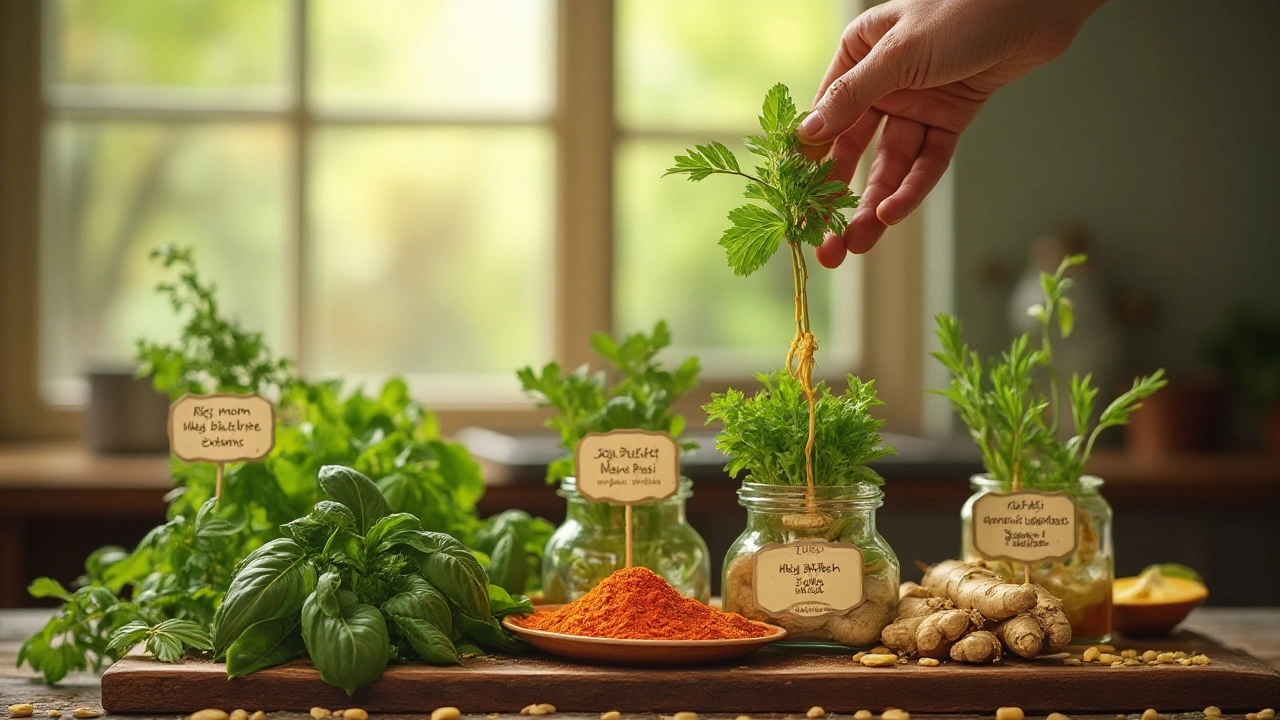In a world where natural wellness continues to take the spotlight, herbal supplements are a go-to choice for many. Undeniably, these nature-derived wonders come loaded with various health advantages. However, choosing the right herb to take daily can be perplexing given the array of options available.
The key lies in understanding the unique benefits each herb offers, aligning them with your personal health objectives. Some herbs aid in enhancing mental clarity, while others bolster physical stamina. By honing in on these distinct properties, you can seamlessly integrate the right herb into your lifestyle, contributing significantly to both your short-term and long-term health goals.
In this exploration, we delve into some of the most sought-after herbs, discuss how to incorporate them effortlessly into everyday life, and highlight any potential side effects to keep in mind. Whether you're new to the world of herbs or looking to expand your knowledge, this guide offers valuable insights tailored for your wellness journey.
- Understanding Herbal Benefits
- Top Herbs to Consider
- How to Choose the Right Herb
- Incorporating Herbs into Daily Routine
- Potential Side Effects and Considerations
Understanding Herbal Benefits
Many people might wonder why herbal supplements have become a staple in the wellness industry. The primary reason is their unique ability to offer a range of health benefits without the harsh side effects often associated with synthetic medications. Herbs have been used for centuries in traditional medicine systems such as Ayurveda and Traditional Chinese Medicine, proving their efficacy and value over time. Each herb carries its own distinct set of benefits, catering to different health needs, which makes them incredibly versatile. For instance, herbs like turmeric and ginger are well-regarded for their anti-inflammatory properties, which are crucial for combating chronic diseases.
The world of herbal supplements is vast, with thousands of herbs each bringing something unique to the table. They serve as natural remedies that work in harmony with the body, addressing both physical and mental health. Herbs such as ashwagandha or ginseng are known for their adaptogenic effects, helping the body manage stress more effectively. This natural anxiety relief can enhance mental clarity and overall mood, which is a significant step towards achieving well-being. A fascinating example is the adaptogen, Rhodiola, which has shown promise in alleviating stress and fatigue according to various studies.
"Herbs are a gentle yet powerful means of restoring balance and vitality to our health," says Dr. Andrew Weil, a notable figure in integrative medicine. This insight speaks volumes about the role herbs play in maintaining not just physical wellness, but also emotional and mental health. The usage of herbal remedies stretches beyond treating symptoms; its holistic approach to healing addresses the root cause of such ailments in most cases.
Another key benefit of using these natural remedies lies in their versatility and accessibility. Whether in the form of teas, capsules, or tinctures, different delivery methods make it easy to incorporate herbs into daily routines. Each method of consumption might offer different rates of absorption and levels of effectiveness. Moreover, certain herbs like chamomile or lavender are also used in aromatherapy for their calming effects, showcasing the multifaceted nature of herbs.
However, with great power comes great responsibility. It is essential to be aware of the potential interactions between herbs and pharmaceuticals. Many herbs can influence the effectiveness or side effects of prescription medications, so it's important to consult with healthcare providers before starting any herbal regimen. This precaution ensures that you maximize the benefits while minimizing any risks associated with these powerful natural allies.
In understanding the profound effects of these wellness enhancers, it's evident that herbs are more than just botanical supplements—they are integral components of a holistic approach to health. Embracing this understanding can bridge the gap between modern science and traditional medicine, ultimately paving the way for a more balanced and enriched life. This knowledge empowers individuals to tailor their health regimen according to specific needs, leading to wellness that feels personal and effective.
Top Herbs to Consider
When it comes to selecting the best herbs for daily consumption, the options might seem almost magical in their diversity and potential benefits. Among the top contenders that have been embraced across cultures and centuries are herbal supplements like turmeric, ashwagandha, and ginger. Each offers unique properties that cater to different aspects of health and wellness, making them staples in many households around the world.
Take turmeric, for example, a vibrant yellow spice often used in cooking but revered for more than just its flavor. It's packed with curcumin, a powerful antioxidant known for fighting inflammation, which can be a catalyst for various chronic diseases. Some studies suggest that including turmeric in your daily diet could substantially support joint health, boost immunity, and contribute to cognitive sharpness. A 2019 study published in the journal "Life Sciences" underscored its potential, noting that consistent curcumin intake may improve memory and mood in the elderly.
Now consider ashwagandha, an adaptogen with a reputation for combatting stress. This ancient herb from Ayurvedic medicine is heralded for its ability to stabilize physiological processes and promote homeostasis. If you're seeking to enhance both mental clarity and physical performance, ashwagandha might be your perfect ally. Its impact extends to potentially lowering cortisol levels, thereby reducing stress and even aiding sleep. According to a 2020 research article in "Medicine," subjects taking ashwagandha reported feeling more centered and energetic over an eight-week period, a testament to its incredible balancing effects.
The spicy root known as ginger rounds off this herbal triad with aplomb. Beyond its culinary use, ginger has a plethora of health applications. Known mainly for its anti-nausea properties, often sought by those enduring motion sickness or morning sickness, ginger also plays a role in digestion by aiding food absorption and eliminating excess gas from the digestive tract. Regular intake is speculated to protect against stomach ulcers and encourage healthy gut flora. A profound advocate of its consumption, Hippocrates himself reportedly used ginger for digestive issues, highlighting its historical significance.
"Let food be thy medicine, and medicine be thy food." — Hippocrates
For individuals looking to integrate these herbs into their lives, variety not only adds flavor but also multiplies health dividends. Incorporating a balance of turmeric in smoothies or ginger in teas makes daily herbal intake a delightful experience. Surveys suggest about 80% of herbal consumers prefer such natural inclusions in their diets over processed alternatives due to their potential benefits and lower side effect profile.
To better illustrate their composition and benefits, let's explore a simple comparison:
| Herb | Primary Benefit | Usage |
|---|---|---|
| Turmeric | Anti-inflammatory | Spice, supplements |
| Ashwagandha | Stress reduction | Powder, capsules |
| Ginger | Digestive aid | Teas, fresh root |
With this arsenal of natural remedies at your disposal, you're well on your way to fortifying your health naturally and effectively. Remember, the journey towards wellness is personal, so choosing a herb that aligns with your specific needs can transform your health journey, bringing vitality and balance to your daily routine.

How to Choose the Right Herb
Navigating the world of herbal supplements can feel like a daunting journey filled with endless possibilities. The trick to finding the right herb for daily use lies not just in understanding what each herb offers but also in considering your own unique health needs and lifestyle. It's important to start this journey by reflecting on your personal health goals. Are you looking to enhance your immune system, relieve stress, or maybe improve digestion? Once you've identified what you're hoping to achieve, it'll be easier to narrow down your options.
Each herb boasts its own set of benefits; for instance, Ashwagandha is often sought for its stress-relieving properties, while Ginger is a beloved choice for aiding digestion. In your quest to find the best daily herb, take a moment to research any contraindications they might have with medications you’re taking or health conditions you may already have. Sometimes, it’s beneficial to consult with a healthcare professional or a certified herbalist who can offer personalized advice and ensure safety.
One well-regarded source in the world of herbal medicine, renowned herbalist David Hoffmann, once emphasized the importance of 'listening to your body' when it comes to herbal choice. He remarked,
"The body's response to herbs can be our greatest teacher—pay attention to how you feel."Such insights remind us of the personal nature of herbal medicine and how experimenting within safe boundaries can be immensely beneficial.
Beyond individual health goals and conditions, consider practical aspects like availability and preparation methods. Fresh herbs might require cultivation or frequent grocery trips, while dried or capsule forms may offer convenience but at the potential cost of reduced potency. Additionally, the ease of incorporating an herb into your daily diet could be another deciding factor. Some herbs, like Turmeric, blend seamlessly into meals or smoothies, while others may only be palatable in capsule form.
Monitoring your progress after incorporating a new herb is crucial. Keep a journal and note any changes in your well-being, both positive and negative. After a consistent period—about four to six weeks is recommended—you'll have a clearer view of whether the herb's effects align with your goals. If not, don’t hesitate to try another option, as what works for one person may not work for another.
In summary, the right herb should not only address your wellness goals but also fit into your routine without much hassle. Armed with knowledge and an open mind, you're well on your way to reaping the potential benefits that nature's pharmacy has to offer, weaving a more holistic approach into your everyday living.
Incorporating Herbs into Daily Routine
Including herbal supplements in your everyday life doesn't have to be daunting. With a little creativity and consistency, herbs can be seamlessly woven into your daily routine. One of the most practical ways to start is by integrating them into your meals. Consider adding herbs like turmeric or ginger to your morning smoothies. These herbs not only enhance flavor but also add a wealth of health benefits, such as anti-inflammatory and antioxidant properties. Starting your day with such herbal goodness can prep you for a vibrant and energetic day ahead.
For those who relish a warm beverage in the morning or evening, brewing herbal teas can be a delightful practice. Chamomile, peppermint, or green tea infused with herbs like ginseng can provide a calming effect, ideal for relaxing post-dinner. Another approach is using culinary herbs—even the basics like oregano or basil—while cooking dinner. They can transform a simple dish into a nutritional powerhouse.
According to the Herbal Medicine Journal, "Incorporating herbs into everyday cooking not only enhances the flavor but also fortifies your meals with medicinal properties."This practice allows you to experiment with different herbs, adjusting flavors and benefits according to your taste and health needs.
Moreover, if you're juggling a busy lifestyle, supplements in capsule or tincture form might be a more convenient option. They require minimal prep time and can easily fit into a hectic schedule. Keep these in places where you are most likely to remember them—near your breakfast cereal or on your work desk. Implement a reminder on your phone to ensure you don't miss out on taking your daily herb.
Creating a habit of taking herbs can also involve setting rituals that you look forward to. This could be as simple as a moment of mindfulness with your tea or as purposeful as a midday break to take a breath and swallow your turmeric supplement. When these moments become cherished rituals, consistency naturally follows, establishing a strong foundation for healthy living.
A significant aspect of incorporating herbs effortlessly is tailoring them to your personal preferences and lifestyle. Observe what aligns best with your daily activities. Some may find it easier to enjoy their herbs at night, while others might prefer morning consumption. The key is mindfulness and flexibility till you find the perfect rhythm. Regularity, after all, is what transforms a new practice into a sustainable habit.
For data enthusiasts, understanding the potency and dosage of your chosen herb is crucial. Here is a simple guideline for a few popular herbs:
| Herb | Suggested Daily Dose |
|---|---|
| Turmeric | 500-2,000 mg (Curcumin content) |
| Ginger | 250-1,000 mg |
| Ginseng | 100-400 mg |
| Chamomile | 9-15 grams of dried flower |
Incorporating herbs into your lifestyle is not just about the physical act; it's also about enjoying and appreciating the experience. Listen to your body, adjust as needed, and relish the journey of using nature's gifts to boost your wellness.

Potential Side Effects and Considerations
Navigating the world of herbal supplements involves understanding not just their myriad benefits but also the potential side effects and considerations. Herbs, much like conventional medicines, can have varied reactions on different people. It’s essential to be aware that, although many herbs are safe for most people, they can cause adverse effects in others depending on their body chemistry, existing health conditions, or medications they are taking. For instance, ginseng, lauded for its energy-boosting properties, might cause sleeplessness or increased heartbeat in some individuals. Meanwhile, St. John's Wort, often used for supporting mental health, can interfere with numerous prescription medications, including antidepressants and birth control pills. Such interactions highlight the need for informed decisions when integrating daily herb intake into your wellness routine.
An important step in preventing potential side effects of herbs is considering personal health status and existing medical conditions. If you have allergies, it's prudent to verify the scientific name and any potential allergens present in the herbal supplement you choose. Those with conditions such as epilepsy, heart disease, or kidney issues should exercise caution, as certain herbs can exacerbate these conditions. Pregnant and nursing women also need to be particularly careful, as the effects of many herbal supplements on an unborn child or infant remain under-researched. Hence, consulting a healthcare provider before starting any new herb is always recommended.
"Herbs are nature’s medicine, but just like all medicines, they should be used wisely and appropriately," suggests Dr. Jennifer Lang, a well-known expert in integrative medicine. Her words serve as a reminder of the balance between benefit and caution.
Another critical consideration is the quality and authenticity of the herbal supplements you choose. As the market for these products expands, so does the potential for encountering subpar or counterfeit products. It's advisable to purchase from reputable sources and verify certifications that ensure quality and safety. Reading reviews and seeking recommendations from those well-versed in natural remedies can also guide you to make better choices. Understanding labels, checking for third-party testing certifications, and being wary of “too good to be true” claims are steps in securing a trusted product. Natural remedies are valuable additions to our health regimen, but ensuring that they are pure and free from contaminants or undisclosed ingredients is paramount.
Lastly, remember that herbal supplements are meant to complement a healthy lifestyle, not replace fundamental health practices such as balanced diets, regular exercise, and medical check-ups. They can significantly enhance your health, but their role is supportive rather than solitary. Being patient with the results and not overwhelming your system with excessive quantities is key. Start with small doses and incrementally adjust as needed based on your body’s response. While they can offer incredible wellness benefits, moderating expectations and having patience is crucial to achieving the desired effects without encountering avoidable side effects.
